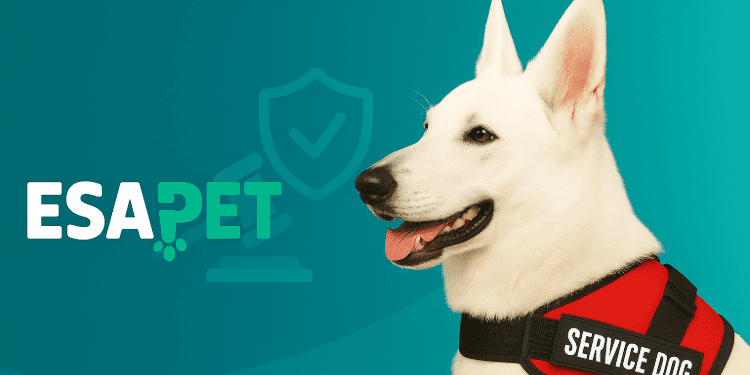Penalty for Refusing Service Dog: What is the Fine in 2026?

Accommodating service dogs is essential for inclusivity. These animals are vital for supporting individuals with disabilities. The Americans with Disabilities Act (ADA) ensures their handlers’ rights in public spaces. Refusing service dogs can lead to serious legal consequences.
Understanding these rules helps businesses avoid penalties. It also protects the rights of people with disabilities. Having the correct documentation, such as a PSD Letter, and creating awareness ensures compliance and encourages accessibility.
What is the Penalty for Refusing a Service Animal?
The U.S. Department of Justice can seek civil penalties up to $118,225 for a first ADA Title III violation and up to $236,451 for later violations. Private lawsuits under Title III typically allow injunctive relief and attorney’s fees, not money damages—though state laws (e.g., California’s Unruh Act) may add statutory damages. Always consult counsel for your situation.
Beyond federal fines, refusals can cause harm to the handler. This may include lost wages, medical expenses, and emotional distress. These penalties emphasize the importance of allowing access to every dog trained to assist with disabilities.
In one case, a store faced backlash for refusing a guide dog. The handler sought legal action, claiming discrimination. Scenarios like this highlight the importance of following service animal regulations.
Get your Official ESA Letter Consultation from a licensed therapist.
Get ESA Letter NowQuick Snapshot: Fines & Legal Consequences
- Up to $118,225 for a first violation
- Up to $236,451 for subsequent violations
- (Imposed by the U.S. Department of Justice)
- Injunctive relief
- Attorney’s fees
- No federal money damages
- State laws (e.g., Unruh Act in California) may allow statutory damages
- Lost income
- Medical expenses
- Emotional distress
A store refused entry to a guide dog. The handler sued for discrimination.
Result: Legal consequences and public backlash.
Lesson: Always follow service animal laws.
- For compliance peace of mind, always consult legal counsel—especially if operating across different states.
What Is the Fine?
Refusing a service animal can result in significant federal penalties under the ADA. Businesses may face fines of up to $118,225 for a first offense and up to $236,451 for subsequent violations.
These fines are federally mandated to enforce compliance and protect the rights of individuals with disabilities. Adhering to service animal regulations is essential. This helps avoid steep penalties and ensure inclusivity.
Restitution Costs and Extra Compensation
Refusing a service animal can lead to extra restitution costs beyond federal fines. Businesses may be liable for damages caused to the handler or the service animal.
- Veterinary Expenses: Covering the cost of treatment for injured service animals.
- Lost Wages: Compensating the handler if the denial affects their employment or work opportunities.
- Medical Expenses: Reimbursing the handler for any medical costs resulting from the refusal.
- Psychological Therapy: Covering costs for emotional harm caused by the refusal of the service animal.
Some restitution may also cover travel disruptions or denied public accommodations. Employee training is key to preventing such outcomes.
Necessary Documentation for Service Animals
The ADA does not require documentation for service animals. Businesses cannot ask for proof of training or medical records. This ensures people with disabilities have equal access without unnecessary barriers.
However, having a PSD Letter can be beneficial in certain situations. A PSD Letter issued by an LMHP confirms the handler’s need for a psychiatric service dog. While not required, it can help resolve disputes in housing or travel scenarios.
For example, landlords must allow service animals even in no-pet housing. Airlines also recognize PSD Letters to simplify boarding with your service dog.
Federal and Local Laws and Regulations on Service Dogs
The ADA sets federal standards for service dog access. It prohibits discrimination and ensures public accommodations. The Air Carrier Access Act (ACAA) reinforces these protections during air travel.
Extra penalties may apply at the state level for violations. California imposes fines and jail time for service dog misrepresentation. These state-level differences work alongside federal laws to strengthen compliance and accountability.
Americans with Disabilities Act (ADA) Federal Requirements
The ADA outlines strict requirements for businesses and public entities to accommodate service dogs. The ADA applies to restaurants, hotels, stores, and all public accommodations. It prohibits blanket “no pets” policies that conflict with the rights of a disabled person.
5 Key Points for Businesses
 Access
Access
Service animals must be allowed everywhere customers are allowed.
(42 U.S.C. § 12182; 28 C.F.R. § 36.302(c))
 Questions You Can Ask
Questions You Can Ask
Businesses cannot request certification or training documents.
You may only ask two questions:
- Is the dog a service animal required because of a disability?
- What tasks has the animal been trained to perform?
(28 C.F.R. § 36.302(c)(6))
 Fees
Fees
No fees or charges are allowed for service animals.
Fees can only be applied for damages if the same rules apply to non-disabled customers.
(28 C.F.R. § 36.302(c)(8))
 Control
Control
Service animals must remain under control at all times.
They should be leashed or harnessed unless it interferes with their tasks.
(28 C.F.R. § 35.136)
 Removal
Removal
Animals may be removed if they misbehave or pose a direct threat.
Handlers can be asked to remove disruptive animals.
Air Carrier Access Act (ACAA) Federal Requirements
The Air Carrier Access Act (ACAA) ensures disabled passengers can travel with service animals. The ACAA applies only to service dogs. Emotional support animals are no longer protected under this act. Airlines must follow these key rules:
- Service animals must be allowed in cabins (14 C.F.R. § 382.117). This includes spaces under seats or on laps when safe.
- Certification is not required. Airlines may only request a DOT form for flights longer than eight hours or if there are behavioral concerns. (14 C.F.R. § 382.117(d))
- No extra fees or ticket costs can be charged for service animals.
- Facilities must include animal relief areas at terminals and escort services to relief areas on request. (14 C.F.R. § 382.63)
- Behavior rules apply. Animals displaying aggression or disruption can be denied boarding. However, airlines must document reasons for refusal.
State-Level Penalties
State laws often include stricter penalties to complement federal protections. State laws address situations such as sterile areas in hospitals or places of worship. While exceptions exist, service animal protections are aggressively enforced. Examples include:
- California: Denying access to service animals incurs a minimum fine of $4,000 per incident. Severe violations involving harm to a service animal can result in fines of up to $10,000 or imprisonment. (Cal. Civ. Code § 54.3; Cal. Penal Code § 600.5)
- Colorado: Willful harm to service animals can result in treble damages. This includes costs for replacement, training, and related losses. (Colo. Rev. Stat. § 24-34-804)
- Florida: Denial of access results in a second-degree misdemeanor. Offenders may also face 30 hours of mandatory community service. Repeat violations can lead to felony charges. (Fla. Stat. § 413.08)
- Texas: Fraudulent claims about service animals are penalized with fines and mandatory community service. (Tex. Hum. Res. Code § 121.005)
Get your Official PSD Letter Consultation from a licensed therapist.
Get PSD Letter NowHow to File a Complaint for Service Dog Denial
If your service dog is denied entry, taking swift action is essential. Following the correct steps ensures your rights are upheld and businesses are held accountable. Filing a complaint can lead to resolutions and prevent future violations.
 Document the Incident
Document the Incident
Record the denial’s date, time, and location. Include the names of employees involved and their statements.
 Contact the Manager
Contact the Manager
Speak with the business manager. Explain that denying service dogs violates the Americans with Disabilities Act (ADA).
 File a Complaint with the Department of Justice (DOJ)
File a Complaint with the Department of Justice (DOJ)
Submit an online complaint on the DOJ’s Civil Rights Division website.
Mail a written complaint to:
- U.S. Department of Justice
- Civil Rights Division
- 950 Pennsylvania Avenue, NW
- Washington, DC 20530
- Call the ADA Information Line at (800) 514-0301
 Explore State Filing Options
Explore State Filing Options
Many states have specific agencies to handle complaints. Check your state’s service animal laws for extra remedies.
 Consider Mediation or Legal Action
Consider Mediation or Legal Action
The DOJ may investigate your case or refer it to the ADA Mediation Program. This process is confidential and often resolves disputes quickly.
 Seek Legal Representation if Necessary
Seek Legal Representation if Necessary
If the issue remains unresolved, consult an attorney familiar with ADA law. They can help enforce your rights under Title II and III of the ADA.
Documents to Gather
Before filing, prepare these essential documents to support your case. Thorough documentation can strengthen your claim and ensure a smoother resolution:
- Detailed Incident Report: A comprehensive record of the denial. This includes the names, statements, and evidence.
- PSD Letter (if applicable): This document is not required under the ADA. However, it may help validate your claim in housing or travel disputes.
- Communication Records: Include emails, letters, or other written exchanges with the business or organization.
- Receipts or Other Proof: Documentation showing your attempt to access the service. This can be receipts or appointment confirmations.
These steps and documents ensure a stronger case when advocating for your rights as a service animal handler. For extra guidance, visit the ADA Resources on Service Animals.
Public Access Rights for Service Dogs
The ADA protects service dogs’ public access rights. These protections ensure individuals with disabilities can navigate public spaces. Without these legal safeguards, many disabled individuals would face barriers to essential services.
These rules ensure inclusivity for individuals who rely on trained animals. Understanding them helps businesses foster inclusivity and avoid penalties for non-compliance.
Get your Official PSD Letter Consultation from a licensed therapist.
Get PSD Letter NowWhere Are Service Dogs Allowed?
Under the Americans with Disabilities Act (ADA) and other federal laws, service dogs are granted broad access rights. These laws ensure that individuals with disabilities can bring service animals to spaces necessary for daily activities.
Businesses and Public Spaces
Service dogs are allowed in nearly all public accommodations. This includes restaurants, retail stores, offices, and other spaces open to the public. Businesses cannot refuse entry based on no-pet policies.
Handlers must ensure that their dogs remain controlled and do not disrupt operations. Misbehavior, such as excessive barking, can lead to the dog’s removal. However, the handler must still receive services.
Housing and Lodging Premises
The Fair Housing Act (FHA) protects service dogs and ESA handlers in residential settings, including those with no-pet policies. Landlords must accommodate service dogs without extra pet fees or deposits.
They cannot deny housing based on the presence of a service dog. Documentation of training or certification is not required. While a PSD Letter is optional, it can help resolve disputes when necessary.
Travel Regulations
The Air Carrier Access Act (ACAA) accommodates service dogs during air travel. Airlines must allow service dogs in cabins at no extra charge. Handlers are not required to provide training certificates.
Airlines may request behavior-related documentation for flights exceeding eight hours. Airports must provide designated animal relief areas and assistance to handlers. Dogs must behave appropriately and not disrupt the safety of other persons.
Learn more: What Are the Most Pet-Friendly Airlines?
Where Are Service Dogs Not Allowed?
Service dogs are allowed in most public spaces, but some exceptions exist. Sterile areas, such as hospital operating rooms, may restrict service dogs for safety reasons.
Private clubs and religious establishments are not required to admit service animals. However, they may choose to accommodate the needs of an individual with a disability. Zoos can limit access to areas where dogs directly threaten animals.
Programs like allergy-safe dormitories may restrict service dogs when necessary. Exclusion is permitted if a service dog behaves aggressively and is not housebroken.
Businesses must still serve a person with a disability if their service animal is excluded. This ensures their ability to access essential services remains intact.
Service Dogs vs. Emotional Support Animals (ESAs)
Service dogs and Emotional Support Animals (ESAs) serve different purposes. Understanding their distinctions helps ensure compliance with laws. It also supports individuals with disabilities in accessing their rights.
Differences in Legal Rights
A service dog is an animal individually trained to perform tasks for disabilities. These tasks are directly related to the person’s disability. Examples include guiding a blind person or alerting someone with PTSD.
ESAs provide emotional support but lack specific task training. They help ease stress, anxiety, or loneliness. Unlike service dogs, ESAs and ESA letters are not protected under the ADA and cannot access public places. However, they are allowed in housing under the Fair Housing Act (FHA).
Benefits of a PSD Letter
A PSD Letter can help in housing or travel disputes. While not required under the ADA, it simplifies access in specific situations. Airlines often accept PSD Letters during flights. This ensures handlers and their dogs travel without issues.
Recognizing the differences prevents confusion and promotes accessibility. It also protects public spaces from misuse of access privileges.
FAQs About Refusing Service Dogs
Refusing access to a service dog can result in fines of up to $118,225 for a first offense. Repeat violations may incur fines of up to $236,451. California law imposes additional penalties of at least $4,000 per denial.
No. Businesses cannot demand certification or proof of training. They may only ask two ADA-compliant questions about the dog’s function and tasks.
Document the denial, including date, time, and location. Contact the manager to explain ADA laws. If unresolved, file a complaint with the Department of Justice or seek legal help.
A PSD Letter confirms the need for a psychiatric service dog. It helps in housing or travel disputes but is not required under the ADA.
Conclusion
Service dogs are vital for individuals with disabilities, offering independence and support. Federal laws like the ADA protect their rights, ensuring access to public spaces. Businesses that fail to comply may face steep penalties.
By understanding service dog regulations and the steps to address denial, both handlers and businesses can ensure compliance, avoid legal issues, and promote inclusivity. Educating businesses about these laws is essential for creating a more accessible and fair environment.


 Access
Access Questions You Can Ask
Questions You Can Ask Fees
Fees Control
Control Removal
Removal Seek Legal Representation if Necessary
Seek Legal Representation if Necessary








